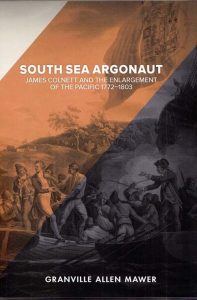- Author
- Book reviewer
- Subjects
- Biographies and personal histories, Book reviews, Biographies
- Tags
-
- RAN Ships
- None noted.
- Publication
- March 2018 edition of the Naval Historical Review (all rights reserved)
By Granville Allen Mawer. Published by Australian Scholarly Publishing, Melbourne, 2017. Paperback of 246 pages with black & white photographs, plans and illustrations. Available from booksellers and online from $44.00.

Granville Mawer has crafted an important historic narrative of an ambitious young seafarer who learns his trade in seamanship, navigation and cartography as a Midshipman serving under Captain Cook. The remainder of James Colnett’s early service career is an exciting progress with engagements against any who dared defy Britannia, from rebellious Americans to disputes and battles with the Spanish, French and Dutch. All this comes to an end when he reaches the rank of Lieutenant; after years of war peace is agreed, there are now too many naval ships, and like many fellow officers Colnett finds himself on the beach.
Relying on his knowledge of the largely unexplored Pacific, Colnett secures the lucrative command of a commercial expedition. At this time fortunes were being made in the maritime fur trade, with North American otter pelts being highly prized for their softness and warmth. The trade had traditionally been conducted by Russians coming south from Alaska into areas nominally claimed by Spain. Newcomers were unwelcome and Colnett, who had intended to build a small settlement, soon finds himself at odds with Spanish officialdom. His ships are impounded and their crews imprisoned leading to the ‘Nootka Incident’ which almost brought Britain and Spain to war.
After an absence of more than five years Colnett returns home, but not for long, as he is given a further command of another expedition using a Royal Naval sloop exploring commercial whaling opportunities in the Pacific. This largely scientific sojourn was of only two years and afterwards Colnett returns to more normal naval duties. He is eventually promoted Post Captain and receives command of a new 28 gun frigate HMS Hussar. For an experienced mariner spending years living on his own wits, skill and courage what could be easier than command of a well found ship operating in home waters? But Hussaris caught in a gale and driven onto the French coast; the crew escape unscathed, but the ship is lost and her crew imprisoned.
After years of hard living and with two imprisonments behind him Colnett’s health begins to fail and he becomes temperamental. During a period of inactivity he wrote widely of his experiences in the Pacific. But there is one last hurrah. With criticisms about the conditions of prisoners transported to New South Wales, a decision is made for a trial using naval ships. Accordingly HMS Glatton,an old ship of the line which started life as an East Indiaman, is fitted out to transport male and female convicts to Botany Bay. She is to be backfilled with native timber, then in short supply in naval yards.
The voyage was successful as with improved ventilation, diet and cleanliness Glattonbrought the healthiest cohort of convicts to our shores. It also demonstrated that large ships such as East Indiamen could safely circumnavigate the globe in nine months sailing time and paved the way for future Australian clipper routes. By now the caricature of a cantankerous old seadog was becoming evident and Colnett’s relationship with his own officers, and especially the Governor of New South Wales, left much to be desired.
There is a glimpse of his private life which tells us he liked a pretty face. As a young officer he had a girlfriend living near Portsmouth but at this time had insufficient prospects to offer marriage. Upon return from his Pacific adventures he forms a liaison with a young shop assistant who falls pregnant. While they do not marry she takes Colnett’s name, the child is brought up as his and becomes a major benefactor under his will. He should have known better, but on passage to New South Wales, the lonely old captain succumbs to the charms of a pretty young female convict – another fascinating anecdote!
During his lifetime Captain James Colnett possibly knew more of the Pacific than any other man. His advice was widely sought and he was known by such luminaries as Sir Joseph Banks and Sir Phillip Stephens (First Secretary of the Admiralty), he had dined with William Pitt (later Prime Minister) and was presented to the Sovereign at Court. He followed in the footsteps of Cook and in his prime was one of finest seamen afloat who did much to advance an appreciation of Pacific affairs. Colnett is acknowledged in Canadian history but remains largely unknown to Australians. The author has excelled in promoting this most interesting character and his contribution to our historical record.
Reviewed by Arcturus




